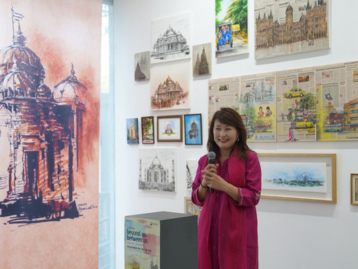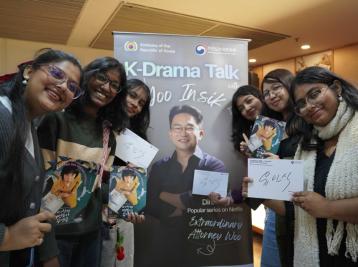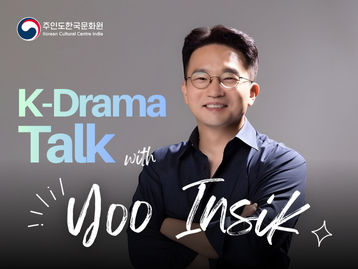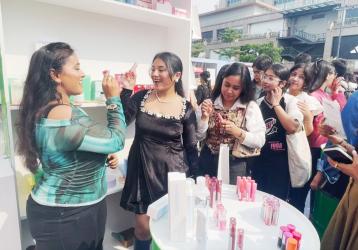Program
-
[ 2026 Seollal Event] Shared hope, connecting two cultures: Our New Year Wishes
The spirit of Seollal, the Korean Lunar New Year, came alive on 17 February as the Korean Cultural Centre India held a vibrant cultural gathering at its centre in New Delhi. This was attented by over 90 students enrolled in its Korean language programmes for an event of tradition, reflection, and cultural exchange. △ Marking the beginning of the Lunar New Year, Seollal is one of Korea’s most cherished holidays – a time for families to gather, pay respects to elders, share blessings, and look ahead with hope. A group of participants holding New Year wish cards. △ The event began with an introduction to Seollal customs, including family greetings, the traditional New Year’s bow (sebae), the sharing of words of blessing (deokdam), and the significance of eating tteokguk (rice cake soup). The representative students and the Korean language instructor demonstrated how to perform a deep bow in front of the participants. △ Participants were guided through the cultural meanings behind these traditions, helping them understand how the Lunar New Year is celebrated in Korea. Participants also learned and practiced the deep bow themselves, creating a truly heartfelt moment. △ The highlight of the celebration was the Full Moon Wish-Making Ceremony. A luminous image of the full moon was projected in the auditorium, recreating the spirit of the first full moon of the lunar year. The students write down their wishes for the year on special wish cards, reflecting on personal goals, gratitude, and dreams for the future.
Post Date 2026-02-19 -
Opening of KCCI’s 13th Anniversary Special Exhibition
“Travelling Sketch: Beyond Us, Between Us” Opening Ceremony Over 200 drawings, watercolours, digital works, and ceramics created by four Korean and Indian artists interpreting each other’s cultures were unveiled. △ Artists led a guided tour, sharing insights into their creative process and cultural perspectives. △ Visitors engaged directly with the artists and artworks, creating a participatory and interactive viewing experience. Lucky draw Event A lucky draw with exhibition-themed gifts added excitement and enjoyment for the attendees. Live group drawing session A live group drawing session invited artists and audience members to create together, blending Korean and Indian visual ideas in real time. Group photo session Artists and visitors came together for a group photo, marking the celebration of the opening event.
Post Date 2025-12-12 -
Director Yoo Insik’s ‘K-Drama Talk’ Concludes Successfully on 4 December
Director Yoo Insik Meets Indian Hallyu Fans K-drama hitmaker Yoo Insik visited the Korean Cultural Centre India, offering fans a rare chance to engage directly with the creator of Extraordinary Attorney Woo and Dr. Romantic. Exclusive Insights into K-Drama Production During a talk, Director Yoo shared his creative philosophy, production process, and behind-the-scenes stories from his globally loved works. Interactive Q&A with Indian Audience Participants engaged in an open Q&A session, discussing memorable scenes, character development, and Yoo’s signature directorial style. Meet-and-Greet and Autograph Session The event concluded with a group photo, followed by meet-and-greet and autograph opportunities, giving fans a personal moment with the acclaimed director. Celebrated Works That Shaped Global K-Drama Fans revisited iconic titles such as Extraordinary Attorney Woo, Vagabond, Pinocchio, and Dr. Romantic, reaffirming Yoo’s influence on global K-drama storytelling, and joined a group photo session to celebrate Hallyu together.
Post Date 2025-12-11 -
K-Drama Talk with Director Yoo Insik at KCCI
K-Drama Talk with Director Yoo Insik at KCCI Meet the renowned PD behind the global hit Extraordinary Attorney Woo, celebrated for his warm storytelling and unforgettable characters. Join us for an exclusive talk session where Director Yoo shares insights into his creative journey, directing style, and behind-the-scenes stories from the drama. ●Date: 4 December 2025 (Thursday) ●Time: 11:00 AM ●Venue: KCCI ○Souvenir for all attendees ○Special autograph session included ○Free entry
Post Date 2025-12-02 -
‘Rang De Korea,’ India’s Largest Korean Cultural Festival, Held Successfully
In October 2025, the Korean Cultural Centre India (KCCI) brought the spirit of Seoul to India’s two largest cities — New Delhi and Mumbai — through its landmark cultural festivals “Rang De Korea” and “K-Harmony Festa.” Held on October 11 at Nexus Select CITYWALK (New Delhi) and October 12 at Jio World Drive (Mumbai), the back-to-back festivals attracted thousands of enthusiastic visitors who immersed themselves in the vibrant world of Korean culture, food, fashion, and performances. △ Before the gates opened, many young visitors lined up eagerly to enter △ Indian youngsters enjoy a Korean-style picnic at the Hangang Park zone. △ Visitors pose in front of the Gangneung Jumunjin bus stop zone, inspired by the location featured on a BTS album cover. △ Visitors exploring K-food stalls at the “Street of Seoul” Jongno experience zone. △ Young visitors try out samples from Amorepacific and several other Korean beauty brands. △ The immersive “Bukchon Hanok Village” zone recreates the charm of traditional Korean architecture, where visitors can also try on Hanbok. △ YOUNITE’s special fan meet — creating heartwarming moments with Indian fans.
Post Date 2025-10-16

![[ 2026 Seollal Event] Shared hope, connecting two cultures: Our New Year Wishes](/imgsvc/View/thumb/f/119429-2)



